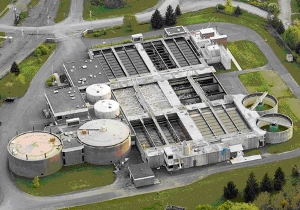Jan 25 2014
Co-digestion of food scraps from Cornell dining halls with wastewater could contribute enough methane to run the city’s wastewater treatment facility, according to a report from a student-based sustainability project.
 Food scraps from Cornell dining halls could help power the Ithaca Area Wastewater Treatment Facility. Credit: Provided
Food scraps from Cornell dining halls could help power the Ithaca Area Wastewater Treatment Facility. Credit: Provided
The mush-to-methane scheme would be even more efficient, the sustainability students suggest, if their fellow students cooperated in two ways: by separating indigestible trash from organic materials when they dump their trays, and by showing up in larger numbers for Cornell summer and winter sessions.
“Over time the process is environmentally beneficial to the facility and community and has the potential to be economically feasible as well,” Cornell undergraduates Adam Pranda, Marina Shumakovich, Sameen Kiayei and Ryan Ashley concluded in “CUSD Anaerobic Digestion: Final Report.”
“We told operators of the Ithaca Area Wastewater Treatment Facility (IAWWTF) that, because they already take in food wastes and other organic materials, we wanted to focus on the feasibility of adding larger volumes from Cornell,” Pranda explained. “The question became: What level of input is required to recoup the cost of upgrades needed at the plant to accept additional material?”
The CUSD (Cornell University Sustainable Design) project subteam researched methane production via anaerobic (without oxygen) biodigestion systems at other sites, including Clarkson University in Potsdam, N.Y., before reviewing what Cornell Dining had to offer.
Run through grinders, food scraps from Cornell Dining facilities would be shipped downtown to the IAWWTF, where microbial biodigesters produce enough methane to burn in electricity-generating turbines. Electricity from the methane turbines already accounts for part of the energy load (pumps, lighting and other functions) at the facility. Even more input would balance the energy equation and possibly supply excess power to the electric grid, according to the student report.
They identified a couple opportunities to make Cornell’s mush-to-methane system more efficient: While employees in the large dining halls are trained to separate indigestible trash (like glass, plastics and metal) from food scraps, students patronizing smaller Cornell Dining outposts around campus are not so diligent. That mixed waste must be sent to the landfill, because neither composting facilities nor biodigesters can process unsorted food waste.
Then there’s the seasonal-supply problem. The fall and spring semesters are busy enough at Cornell Dining; summertime and wintertime, not so much. To operate at peak efficiency, anaerobic digestion needs a consistent source, according to the CUSD report.
At Cornell Dining, where compostable food is picked up by the university's Farm Services unit and hauled to a central composting facility, a spokesperson said the students' sustainability proposal was "open for discussion."
Whatever the outcome, there's always room for improvement, said Karen Brown, director of Campus Life marketing and communications. "Post-consumer composting is very difficult to manage," she said. "Items do end up in the landfill if customers do not properly sort their recycling, compostable material and landfill material."
The Dec. 23 report left one more puzzle for the next round of research: What to do with tons of organic residue when the methane is siphoned off?